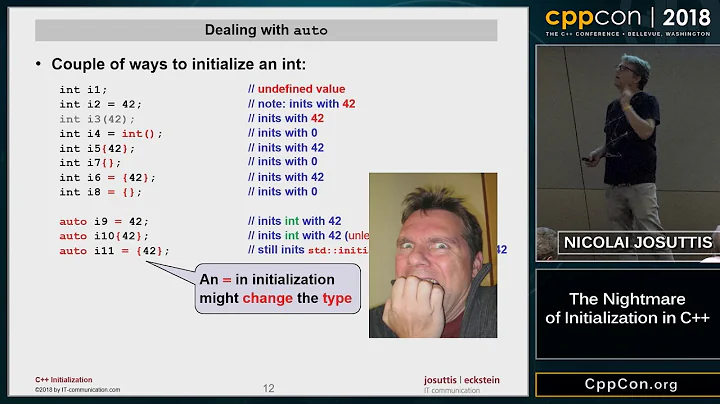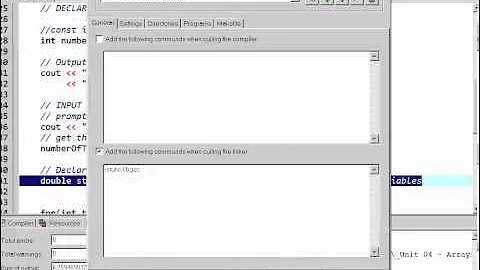error: ISO C++ forbids in-class initialization of non-const static member
Solution 1
The initialization of the static member counter must not be in the header file.
Change the line in the header file to
static int counter;
And add the following line to your employee.cpp:
int Employee::counter = 0;
Reason is that putting such an initialization in the header file would duplicate the initialization code in every place where the header is included.
Solution 2
According to a similar SO answer there is another approach, in particular suited for your current implementation (header-only library):
// file "Employee.h"
#ifndef EMPLOYEE_H
#define EMPLOYEE_H
class Employee {
public:
Employee() {
getCounter()++;
}
~Employee() {
getCounter()--;
}
static auto getCount() -> std::size_t {
return getCounter();
}
private:
// replace counter static field in class context,
// with counter static variable in function context
static auto getCounter() -> std::size_t& {
static std::size_t counter = 0;
return counter;
}
};
#endif //EMPLOYEE_H
I took the liberty to use std::size for representing the non-negative employee count and trailing return syntax for functions.
Accompanying test (ideone link):
#include "Employee.h"
int main() {
std::cout << "Initial employee count = " << Employee::getCount() << std::endl;
// printed "count = 0"
Employee emp1 {};
std::cout << "Count after an employee created = " << Employee::getCount() << std::endl;
// printed "count = 1"
{
Employee emp2 {};
std::cout << "Count after another employee created = " << Employee::getCount() << std::endl;
// printed "count = 2"
}
std::cout << "Count after an employee removed = " << Employee::getCount() << std::endl;
// printed "count = 1"
return 0;
}
Related videos on Youtube
Comments
-
mishelashala about 4 years
this is the header file: employee.h
#ifndef EMPLOYEE_H #define EMPLOYEE_H #include <iostream> #include <string> using namespace std; class Employee { public: Employee(const string &first, const string &last)Overloaded Constructor
: firstName(first),firstName overloaded constructor
lastName(last)lastName overloaded constructor
{ //The constructor start ++counter;it adds one plus per each object created;
cout << "Employee constructor for " << firstName << ' ' << lastName << " called." << endl; } ~Employee() {Destructor cout << "~Employee() called for " << firstName << ' ' << lastName << endl;
Returns the first and last name of each object
--counter;Counter minus one
} string getFirstName() const { return firstName; } string getLastName() const { return lastName; } static int getCount() { return counter; } private: string firstName; string lastName; static int counter = 0;Here is where i got the error. But, why?
};principal program: employee2.cpp
#include <iostream> #include "employee2.h" using namespace std; int main() { cout << "Number of employees before instantiation of any objects is " << Employee::getCount() << endl;Here ir call te counter's value from the class
{Start a new scope block
Employee e1("Susan", "Bkaer");Initialize the e1 object from Employee class
Employee e2("Robert", "Jones");Initialize the e2 object from Employee class
cout << "Number of employees after objects are instantiated is" << Employee::getCount(); cout << "\n\nEmployee 1: " << e1.getFirstName() << " " << e1.getLastName() << "\nEmployee 2: " << e2.getFirstName() << " " << e2.getLastName() << "\n\n"; }end the scope block
cout << "\nNUmber of employees after objects are deleted is " << Employee::getCount() << endl; //shows the counter's value } //End of MainWhat is the problem? I have no idea what's wrong. I have been thinking a lot, but a i do not what is wrong.
-
PMF over 10 yearsI don't think that's what he wants, since counter is being modified later.
-
Uchia Itachi over 10 years@PMF: Yeah, you're right!
-
mishelashala over 10 yearsI want initialize counter and later increment it with the constructor. Then decrement it with the destructor.
-
SwiftMango over 10 yearsI don't think the error message can be any clearer.
-
 mucaho over 8 years@texasbruce The error message only tells you what's wrong, not how to solve the problem.
mucaho over 8 years@texasbruce The error message only tells you what's wrong, not how to solve the problem.
-
-
mishelashala over 10 yearsI did it, but it returns: In function ‘int main()’: error: ‘int Employee::counter’ is private error: within this context
-
PMF over 10 years@user3053929: Where did you put it? It needs to be outside any function but where the class Employee is known. BTW: Why is your cpp file called employee2.cpp? And including employee2.h?
-
mishelashala over 10 yearsBecause i did another one. But it does not matter. Thank for the info
-
 BozanicJosip over 6 yearsif that's sole reason why it's prevented, why const members are allowed? Don't they get initialized in every place where the header is included aswell?
BozanicJosip over 6 yearsif that's sole reason why it's prevented, why const members are allowed? Don't they get initialized in every place where the header is included aswell? -
PMF over 6 years@JesusChrist: Not sure. Either it wouldn't matter if the const member got a new memory location every time (in fact existing multiple times) or not at all (because it gets eliminated by the compiler)








